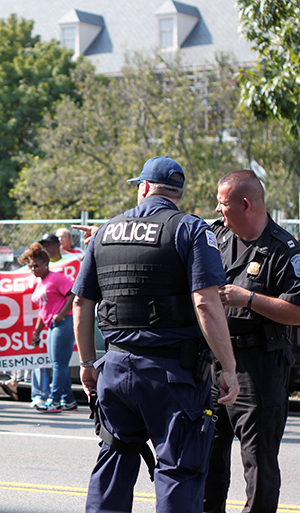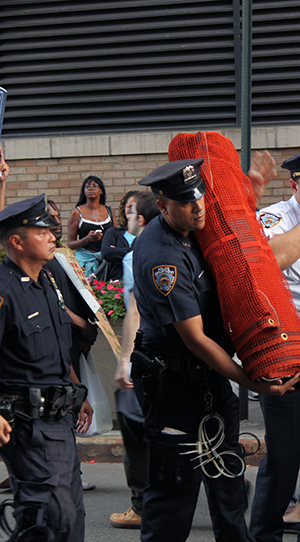 Imagine: You’re outside, playing with your kids. Suddenly, four police cars and two fire trucks show up. Police are yelling at you, saying that you could be arrested for endangering your children. You disagree with them, explaining that there is no cause for alarm and that your children are perfectly safe. The police cite you for disorderly conduct.
Imagine: You’re outside, playing with your kids. Suddenly, four police cars and two fire trucks show up. Police are yelling at you, saying that you could be arrested for endangering your children. You disagree with them, explaining that there is no cause for alarm and that your children are perfectly safe. The police cite you for disorderly conduct.
This is precisely what happened recently to Charles Eisenstein, author of Sacred Economics. Eisenstein elicited the presence of police and fire officials when he took his children out to play on the frozen Susquehanna river. In his judgment, the ice was very thick and safe to walk on. In the eyes of the officers dispatched to the scene, his actions were a reckless disregard for safety.
According to Eisenstein, the ice was clearly very thick and his children were benefiting from the joy of exploring the frozen river. Yet, ultimately, the question of whether or not to play on the ice was less important than the principle of upholding social norms. He writes:
I think what disturbed them was the violation of normality that our little adventure represented. It makes people uncomfortable to see someone flaunting social norms. … That’s why the charge of “disorderly conduct” is appropriate. What we were doing deviated from the established social order.
 At the root of the incident was a struggle over authority. Whether playing on the ice was dangerous or simply a good way to spend the afternoon, Eisenstein had a choice to make about how he was going to react to the police. He could pretend to be sorry for playing out on the ice and probably avoid a citation, or he could be honest. Eisenstein chose to speak honestly (and non-submissively) with the police officers. The result was a citation for disorderly conduct.
At the root of the incident was a struggle over authority. Whether playing on the ice was dangerous or simply a good way to spend the afternoon, Eisenstein had a choice to make about how he was going to react to the police. He could pretend to be sorry for playing out on the ice and probably avoid a citation, or he could be honest. Eisenstein chose to speak honestly (and non-submissively) with the police officers. The result was a citation for disorderly conduct.
Despite the fact that Eisenstein felt that he had done nothing wrong, he writes that it was hard to resist the feelings of shame as he was confronted by twenty men and women in uniform. He found that deep within him, there was a basic drive to be accepted by the group. Public shaming is a powerful motivator.
As Eisenstein himself points out, these observations on the power of social pressure have relevance far beyond the legal realm. Societal order is enforced through shame in many areas of our lives. At work, among friends, and even within families and faith communities, many of our most basic social relationships are maintained by making others so uncomfortable that they choose to submit to the group rather than follow their own conscience.
This is a great challenge for those of us who are trying to walk in the way of Jesus. During his ministry on earth, the Lord was constantly getting into trouble with the ruling authorities and experts. Polite society tried to shame him into silence in every way possible, before finally resorting to the ultimate shame: a humiliating death on a cross. To be friends of Jesus will often mean defying the norms and expectations of our society. It will mean being confronted by the shame that is leveled at everyone who seriously challenges the status quo.

This is a path that can only be walked in community. Isolated individuals, standing alone, are virtually powerless to embrace a radically different way of life. We need friends who can remind us whose authority we are living under, that it is Jesus who calls the shots in our life, even when the surrounding culture says differently.
Have you ever experienced times when your sense of right and wrong conflicted with that of the authorities – whether parents, police, work supervisors or teachers? How did you deal with those situations? How can we, as Christian communities, draw closer to Jesus and let him lead us, even when he goes against the grain of society’s expectations? How can we encourage one another to stand firm in our convictions, even in the face of shame and social pressure?